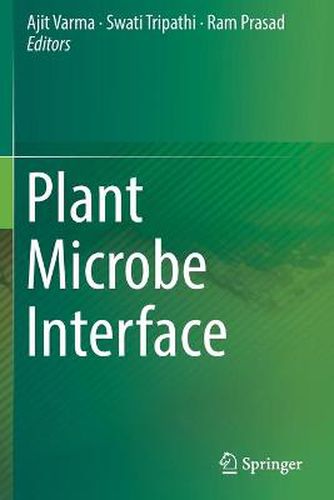Readings Newsletter
Become a Readings Member to make your shopping experience even easier.
Sign in or sign up for free!
You’re not far away from qualifying for FREE standard shipping within Australia
You’ve qualified for FREE standard shipping within Australia
The cart is loading…






This title is printed to order. This book may have been self-published. If so, we cannot guarantee the quality of the content. In the main most books will have gone through the editing process however some may not. We therefore suggest that you be aware of this before ordering this book. If in doubt check either the author or publisher’s details as we are unable to accept any returns unless they are faulty. Please contact us if you have any questions.
This book shares the latest insights into the genetic basis of molecular communication between plants and their microbial consortia. Further, the book highlights the capabilities of the rhizosphere and endosphere, which help manage ecosystem responses to climate change, nutrient cycling and sequestration of carbon; and discusses their application to the development and management of renewable energy sources.
In their natural environments, plants are surrounded by a tremendous number of microorganisms. Some microbes directly interact with plants in a mutually beneficial fashion, while others colonize plants solely for their own advantage. In addition, microbes can indirectly affect plants by drastically altering their environments. Understanding the complex nature of the plant-microbe interface (PMI) can pave the way for novel strategies to improve plant productivity in an eco-friendly manner.
The PMI approach focuses on understanding the physical, molecular, and chemical interactions between organisms in order to determine their functional roles in biological, physical, chemical and environmental systems. Although several metabolites from plants and microbes have now been fully characterized, their roles in chemical interactions between these associates remain poorly understood, and require further investigation.
$9.00 standard shipping within Australia
FREE standard shipping within Australia for orders over $100.00
Express & International shipping calculated at checkout
Stock availability can be subject to change without notice. We recommend calling the shop or contacting our online team to check availability of low stock items. Please see our Shopping Online page for more details.
This title is printed to order. This book may have been self-published. If so, we cannot guarantee the quality of the content. In the main most books will have gone through the editing process however some may not. We therefore suggest that you be aware of this before ordering this book. If in doubt check either the author or publisher’s details as we are unable to accept any returns unless they are faulty. Please contact us if you have any questions.
This book shares the latest insights into the genetic basis of molecular communication between plants and their microbial consortia. Further, the book highlights the capabilities of the rhizosphere and endosphere, which help manage ecosystem responses to climate change, nutrient cycling and sequestration of carbon; and discusses their application to the development and management of renewable energy sources.
In their natural environments, plants are surrounded by a tremendous number of microorganisms. Some microbes directly interact with plants in a mutually beneficial fashion, while others colonize plants solely for their own advantage. In addition, microbes can indirectly affect plants by drastically altering their environments. Understanding the complex nature of the plant-microbe interface (PMI) can pave the way for novel strategies to improve plant productivity in an eco-friendly manner.
The PMI approach focuses on understanding the physical, molecular, and chemical interactions between organisms in order to determine their functional roles in biological, physical, chemical and environmental systems. Although several metabolites from plants and microbes have now been fully characterized, their roles in chemical interactions between these associates remain poorly understood, and require further investigation.